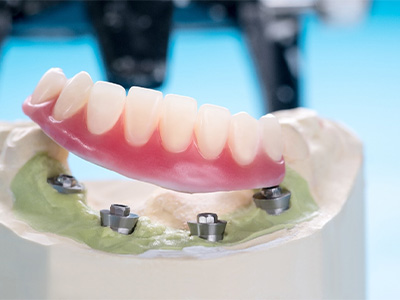Dentures – Spring Hill, TN
Replace Missing Teeth with New Ones

Depending on the situation, you may be missing a few pearly whites. There’s no shame if you are — tooth loss can happen to anyone! Still, lacking teeth can make things like eating and speaking a challenge. Fortunately, though, you can always try dentures in Spring Hill! Those offered by Family Dental Associates of Spring Hill are great at restoring even the most broken smiles. To learn more about them, just keep reading or book a visit to our office.
Who’s a Good Candidate for Dentures?

Beyond tooth loss, it doesn’t take much to be a good dentures candidate. Most patients can get treatment regardless of how many teeth they’ve lost. That said, you should still attend an in-person consultation at our office. Drs. Allen and Jewell can settle for sure whether dentures suit you. As for how they’d do so, the vetting process is pretty straightforward. Just keep reading to learn more about it, or call us for the details.
Effects of Missing Teeth

As a precaution, the consultation starts by reviewing tooth loss’s causes and effects. This step helps you grasp how treatment could benefit your oral health.
Ultimately, people can lose teeth for a wide range of reasons. A patient’s tooth could, for instance, decay so much that it falls out or needs extraction. Another person may suffer gum disease, which wears down the bone and tissue holding teeth in place. Yet others could have their teeth knocked out from physical force, likely due to a sports injury or accident.
Despite the variety of causes, tooth loss’s effects are consistently harsh. Losing teeth almost always makes everyday tasks – eating, speaking, smiling, etc. – harder. Worse yet, the gaps caused by missing teeth erode your jaw. (This erosion then triggers facial collapse if left alone.) Those same spaces can subsequently cause even more tooth loss.
What Qualifies You for Dentures?

As said earlier, most patients can qualify for dentures if they lack teeth. There are, however, other qualifying factors to consider.
Your general oral health is one such consideration. For example, dentures only work if a patient’s gum and jaw tissues are healthy enough. A good treatment candidate is thus strongly committed to dental care. Furthermore, tooth loss isn’t the only condition dentures can treat. These restorations can also replace sensitive or decaying teeth.
The number of missing teeth is also a relevant fact. Depending on how many are gone, you’ll need one of two possible denture types. One might be the partial denture, which only replaces a few teeth. In contrast, you may need a full one if all (or most) of your pearly whites along an arch are missing.
Money is also a vital issue to assess in denture treatment. New teeth, after all, don’t come free; they have an attached expense. Luckily, it so happens that dentures are cheaper than
Alternative Tooth-Replacement Options

In the event you’re not a good dentures candidate, don’t worry. We at Family Dental Associates of Spring Hill have other tooth replacement options. In fact, there are two such procedures you could try. These are:
- Dental Bridges – Fixed restorations, dental bridges are made of two (or more) crowns fused to a pontic. They only replace one or a few teeth, so they rely on natural pearly whites to support themselves.
- Dental Implants – Dental implants are prosthetic teeth placed in the jawbone. As such, they gradually fuse with the jaw over time. However, this fusion requires healthy bone tissue and can make implant treatment expensive.
Types of Dentures

Before getting dentures, you must first talk with Dr. Allen or Dr. Jewell at a consultation. Doing so gives her a chance to learn your smile goals, medical history, and more. From there, she can determine the type of denture that works best for you.
Partial Dentures
Per their name, partial dentures only replace a few pearly whites in your mouth. They’re normally removable and rely on natural, adjacent teeth for support.
In general, partial dentures’ bases are made of plastic (resin), cast metal, or porcelain. Regardless, though, these materials are usually color-matched to your gums.
Full Dentures
Unlike a partial one, a full denture restores an entire arch of teeth. That being the case, it doesn’t rely on natural teeth to remain secure. Rather, it uses natural suction to stay in your mouth over time.
Full dentures have the same materials for their bases as other kinds. Still, an added perk is that they’re custom-made to fit comfortably over your gums.
Implant Dentures
As you might expect, implant dentures are connected to dental implants. The latter are restorations that fuse with your jaw.
Thanks to their implants, implant dentures are more permanent than other options. For that reason, they don’t slip or fall when you eat or speak. Better yet, their stability lets them restore more of your bite force. Given such traits, these dentures are a great alternative for patients who aren’t happy with traditional models.
The Benefits of Dentures

Gaps in your grin can greatly impact your daily quality of life because simple tasks that were once so easy to complete, like smiling, speaking, and eating, suddenly become much more challenging. Thankfully, our team at Family Dental Associates of Spring Hill can restore your mouth’s appearance and functionality simultaneously with lifelike dentures.
These versatile prosthetics provide a wide range of benefits that can increase both your oral and general well-being. Continue reading to learn more, and feel free to contact us with additional questions.
Psychological Benefits

If you have missing teeth, you’re more likely to struggle with your confidence because the sudden changes in your abilities can leave you feeling frustrated or depressed. Plus, you might worry about how others will perceive the alterations in your appearance.
You can boost your self-esteem with lifelike dentures that are customized to look and feel just like the teeth that you’ve lost. With these lifelike restorations in place, you can once again enjoy meals, conversations, and social interactions without wondering if you’re being judged.
Clearer Enunciation

Your teeth are crucial to your ability to speak clearly because you press your tongue against them in specific ways to form different sounds. When there are holes in your smile, you can develop a lisp or other issues with your speech patterns.
Dentures act as artificial teeth to allow you to communicate more clearly with others. However, it might take about a month for your tongue and supporting muscles in your mouth to learn to accommodate your restoration. If you’re struggling with this transition, practicing certain words can help you adjust more quickly.
Improves Nutrition

You rely on your teeth to help you grind your food into bits small enough to be easily swallowed and digested. When some are absent, you might have a hard time biting into or thoroughly chewing many healthy ingredients like raw fruits and veggies and certain cuts of meat. It’s not uncommon to have gastrointestinal problems or become malnourished as a result.
Fortunately, your prosthetics restore a great deal of your chewing power so you can eat a wholesome diet that supports all your body’s needs.
Preserves Oral Health

Any natural teeth remaining in your mouth are prone to becoming misaligned because they tend to shift out of place to fill in any spaces left behind by ones that fell out. This can wear down your enamel unevenly or prematurely, leaving you at a greater risk of cavities or gum disease.
Wearing dentures ensures that they remain in their rightful places to protect your dental well-being.
Expands Opportunities

Your smile is one of the first things people notice about you, and if it’s not whole, you might not be remembered for the right reasons. It might send the wrong message, like that you don’t know how to care for yourself or aren’t willing to. In fact, according to a 2019 study, the probability of being employed is negatively associated with poor dental health.
Upgrading your grin with dentures can lead to more rewarding job opportunities and deeper and more meaningful relationships.
How Dentures are Made

While you weigh whether to get dentures, you should learn how they’re made. Doing so will help you respect these prosthetics and the team that makes them. Having said that, you may not know where to start your knowledge-hunting; denture creation isn’t a common topic. One solution is to rely on us – our practice has listed a helpful primer on how dentures are made. To get the basics down, just keep reading or call us to book a visit.
What are Dentures Made Of?

Every denture (regardless of type) has two crucial parts: a base and artificial teeth. These components form most (if not all) of the prosthetic, so consider their features and roles below:
- Denture Base – The base is a core structure that supports a denture’s teeth. Given that fact, it’s usually made of durable acrylic, nylon, porcelain, or metal. Acrylic is the most common of these base materials, though the others (especially nylon) can be good substitutes.
- Artificial Teeth – Per the name, a denture’s artificial teeth are its tooth-replacing portions. Dental labs make them from resin or porcelain that matches your smile’s overall color.
The Denture Creation Process

Any given denture is custom-made for its patient, so making one involves a multi-step process. The relevant steps are as follows:
- Step 1: Our dentists will first take a dental impression, which helps us design a plaster model that matches your denture’s size and shape.
- Step 2: We’ll send the plaster model to a dental lab that uses it to make a wax gumline.
- Step 3: When the wax gumline is ready, lab workers will set artificial teeth in it. They’ll then have made a prototype denture for the final one.
- Step 4: We’ll receive the prototype denture from the lab and see if it fits your mouth. From there, we’ll send it back.
- Step 5: After boiling it to remove wax, a worker will place the prototype in a flask. The flask itself will receive plaster and sit in hot water.
- Step 6: A separator will go into the plaster layer and keep the acrylic from sticking. Next, this acrylic will be injected into the flask to replace the wax.
- Step 7: The dental lab will remove all plaster to reveal the final denture. Then, they’ll place the restoration in a bath to remove its residue.
- Step 8: For safety and cleanliness, workers will remove the denture’s excess acrylic and polish its surface.
- Step 9: Our office will fit your final denture, ensuring it works smoothly and easily.
Adjusting to Your New Dentures

As you start wearing dentures, your mouth may feel a bit sore. That’s to be expected – you’ll need some time to adjust to your new teeth. Once you’ve had them for a few weeks, they should feel familiar and won’t cause issues.
All that said, speeding up the adjustment is possible. One approach would be to exercise your facial muscles; you’d strengthen them to handle dentures. Similarly, you could eat soft foods to avoid pain or use adhesives to enhance security. Such habits would help the dentures feel natural in less time.
If your initial denture pain persists, you should call our office. There’s a good chance your new restorations need a few more alterations.
The Benefits of Dentures

With dentures from Spring Hill, you can expect to receive various perks. These include:
- A Natural-Looking Smile: Dentists customize each denture for their patients, meaning the prosthetics always look lifelike and beautiful.
- A Fuller Face: Implant dentures help preserve your jawbone’s density. As such, they prevent facial collapse and keep your face youthful.
- Easier Eating: By filling out your smile and restoring your bite, implant dentures let you eat your favorite foods.
Understanding the Cost of Dentures

Taking the steps necessary to get your new dentures can be an exciting time in your life, especially if you’ve suffered from prolonged tooth loss. However, sometimes that excitement can be lessened when the time comes to figure out the financial aspects of acquiring them. That’s why at Family Dental Associates of Spring Hill, we want to make sure there are no surprises when it comes to payment for your new prosthetics. Continue reading below to find all you’ll need to build your budget.
Factors that Affect the Cost of Dentures

There are three major factors that affect the cost of dentures:
- Acrylic Base: The type of acrylic the base of your prosthetic is made from and the model you choose both influence the overall cost. Some are made of pure acrylic, others have metal attachments, and some are more detailed and lifelike than others.
- False Teeth: Likewise, the teeth that are molded into the base can be made of different materials. Porcelain is becoming more popular due to its natural appearance and its durability.
- Preparatory Treatments: If you need other procedures before you can get fitted with dentures such as extractions or gum disease treatment, they can also factor into the total cost.
It’s important to note that less expensive options aren’t always the “cheapest” in the end. Inferior quality materials may become worn or damaged more easily, and you could end up spending more to replace them.
Are Implant Dentures More Expensive?

Implant dentures most always come with a greater up-front cost when compared with traditional prosthetics. However, they offer far greater benefits and can be a more cost-effective option depending on your circumstances.
Implanted dentures are secured via four to six dental implants that are surgically placed into your jawbone. These titanium fixtures serve as an anchor for the customized prosthetic that’s placed over them. While there are removable implant dentures, the more popular choice is to have them permanently affixed.
Implanted dentures are less bulky and don’t slip at all while eating or speaking. They’re also easier to care for than regular dentures and can last for decades with proper oral hygiene and a considerate diet.
Does Dental Insurance Cover Dentures?

While dentures are generally covered under “major procedures” in many dental insurance plans, it can vary by provider. If you’re considering dentures as your preferred tooth replacement option, we’ll help you sort out all the details of your insurance coverage before your treatment starts. Our staff is highly knowledgeable when it comes to the ins and outs of different insurance plans, so they won’t have any difficulty in making claims or finding answers for you.
Other Options for Making Dentures Affordable

At Family Dental Associates of Spring Hill, we believe that no patient should be excluded from treatment because they don’t have insurance or can’t afford it right away. This is why our office proudly offers financing through CareCredit, a service that allows qualifying patients to finance their procedures via a CareCredit card and pay it off a little at a time with low to no interest.
Dentures are more than prosthetics, they’re a lifeline for patients suffering from tooth loss. If you’re wondering whether this option is right for you, call us today to schedule a consultation with Dr. Allen or Dr. Jewell. They’ll assess your oral health and help you navigate the process from start to finish!
Dentures FAQs
Is It Hard to Talk with Dentures?
When first receiving your brand-new dentures, you might expect it to take some time to get accustomed to speaking with them. The good news is that your prosthetics can begin to feel much more natural the more you practice with them. In many cases, patients may develop a mild lisp or other speech impediment, but it should be short-lived and will go away after you have learned how to handle your dentures. Make sure to take time reading aloud to yourself, conversing regularly with people you trust, and repeating more difficult sounds and words every day. You might also ask our team about denture adhesive if you require extra stability to help with this adjustment process.
Can I Sleep with My Dentures?
For the first 24 hours of getting your new dentures, you’ll be required to wear them all day, even during bedtime. Afterward, however, our team will highly recommend that you take them out before going to bed moving forward. Wearing your dentures for too long can end up restricting blood circulation to your gums, which can lead to soft tissue irritation and an increased chance of ridge resorption. Removing them before sleeping will allow your gums to get the nutrients they need to remain strong and healthy. Additionally, having your dentures in for extended periods can increase the risk of poor oral hygiene and developing pneumonia.
Will It Hurt to Get Dentures?
The main reason you might expect some discomfort related to dentures is if you require oral surgery beforehand. Fortunately, even if you go through an extensive procedure to prepare your mouth for your custom prosthetics, any pain should be manageable with over-the-counter or prescribed pain medications. After receiving your new dentures, it’s normal to experience some mild soreness as your mouth becomes accustomed to your new pearly whites. If you notice any pain or aching being persistent or getting worse over time, notify our team so that we can determine if you need your dentures refitted or replaced altogether. You might even have a developing oral health issue that needs treatment.
How Long Will You Have to Wait to Get Dentures After Your Teeth Are Pulled?
In many cases, patients will be asked to wait around six to eight weeks after getting tooth extractions to undergo the denture process. Two months of recovery will allow the gums to heal properly, and you’ll need to practice great oral hygiene to avoid developing any complications like periodontal disease, decay, or infection. The amount of time you need to wait will also depend on the kind of prosthetic you require, such as partials, full, and implant-retained ones. While regular dentures can be received after you’ve recovered completely, implant dentures will need four to six months for the metal posts to integrate with your jawbone.
I Need a Checkup & Cleaning I Need a Dentist for My Child I am Worried About Bleeding Gums I Have a Cavity or Broken Tooth I am Missing One or More Teeth I Want to Enhance My Smile I Want a Straighter Smile I am Scared of the Dentist I am in Pain & Need Help I Need My Wisdom Teeth Removed View Our Services
